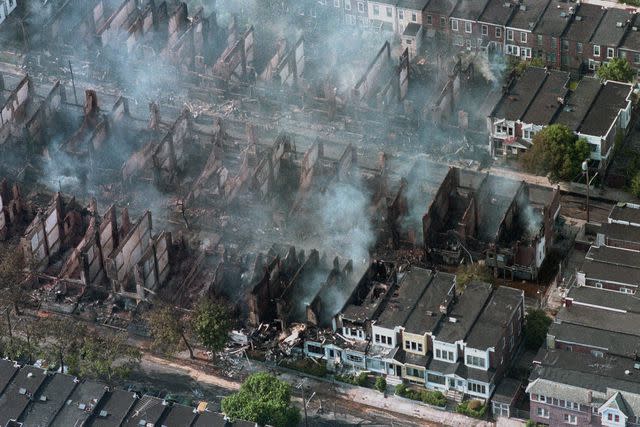Remembering Black Power Organizations Accurately Is an Act of Resistance
- Oops!Something went wrong.Please try again later.
Though organizations like MOVE, the Black Panthers, and BLM have been central in maintaining Black communities, they are publicly remembered in problematic ways.

Bettmann/Getty Images
Fact checked by Karen Cilli
Over 35 years after the Philadelphia Police Department bombed the home of the Black liberation organization MOVE, many questions linger about how the victims’ remains were handled over the years and the ways Black power organizations are generally treated which undermine their legacies.
A tragic day for the families and community of the six adults and five children killed has been relived as the alleged remains of 14-year-old Katricia Dotson and 12-year-old Zanetta Dotson were passed back and forth between the University of Pennsylvania, Princeton University, and the Smithsonian’s National Museum of Natural History for teaching and examining purposes over the years. A recent investigation from the New York Times follows the complicated journey of identifying and properly handling the human remains, with the bones of two victims only recently being returned to their kin.
MOVE, originally named the Christian Movement for Life, was founded in 1972 by John Africa, who was born Vincent Leaphart. Africa, born and raised in Philadelphia, garnered a heavy following as his beliefs were compiled in a document called “The Guidelines.” The document outlined his value of all living organisms and the organization worked to combat police brutality and defend animal rights and enforced his anti-medicine and science beliefs.
The majority-Black organization had encounters with the police long before the tragic bombing that left their leader dead. It was no secret that Philadelphia’s mayor at the time, Frank Rizzo—also the city’s former police commissioner—was an opponent of the activist group, referring to them as “barbarians.” In 1977 several members of the organization were jailed for inciting a riot, and the following year an hour standoff between the group and law enforcement resulted in one officer being killed.
Most of the organization’s communal efforts like its neighborhood carwash and care for the elderly are overshadowed by the 1985 bombing and some of the odd methods that often caused conflict between them and their neighbors and law enforcement.
Despite its communal values, the organization has its own complicated journey with cultish accusations and reports of abuse from ex-members. It’s difficult to draw conclusions about the organization that still exists as allegations of physical and mental abuse from ex-members surfaced last year.

Bettmann/Getty Images
In spite of its peculiarity, MOVE serves as a reminder of the need for Black, justice-minded organizations and the violent resistance groups like these often face. The excessive bombing and mishandling of the victims’ remains sends a message to organizers and advocates of Black liberation movements that work to uplift Black family values. Over the years we have seen the disparate handling of Black protesters by law enforcement and the numerous laws on the books to make the penalty for protesting much harsher, like a recent Florida law that would revoke an arrested protester’s right to vote.
The resurgence of the Black Lives Matter movement in 2020 following the killings of George Floyd, Ahmaud Arbery, and Breonna Taylor resulted in over 10,000 protesters being arrested at demonstrations across the country. Like MOVE, the Black Lives Matter Global Network Foundation has its own controversies such as one of its leaders, Shalomyah Bowers, being accused of stealing $10 million worth of donations.
Scandals often overshadow the work of countless on-the-ground organizers and activists doing honest work for their communities. The virality of a Shaun King controversy for instance can quickly garner the attention of social media users more than the work of a small organization that feeds their communities or clothes children.
And this isn’t exclusive to MOVE and Black Lives Matter. The Black Panther Party was founded in the late 1960s by Huey P. Newton and Bobby Seale to defend Black neighborhoods from police brutality, with one of their first major campaigns demanding justice for the killing of Denzil Dowell by police. The Black Panther’s free breakfast program that fed thousands of hungry children, free sickle cell testing, and education programs are overshadowed by a public perception influenced by the United States government of them being racist and violent despite them only believing in the use of violence in self-defense.
Black progression efforts from the Black Panthers were so successful yet threatening to the government, the FBI created the counter-intelligence program, COINTELPRO to "expose, disrupt, misdirect, discredit, or otherwise neutralize the activities of the Black nationalists.” FBI director J. Edgar Hoover called the organization “the greatest threat to the internal security of the country.”
Related: 8 Martin Luther King Jr. Quotes to Teach Our Children How Radical He Was
The assassination of Chicago Black Panther leaders Fred Hampton and Mark Clark by police in 1969 and the bombing of the MOVE home bares the question of why organizers that labor to protect Black lives and values are such a threat to the status quo of America, while the behavior of white supremacists is not challenged in the same manner?
The destruction of Black neighborhoods and communities like the Philadelphia neighborhood that housed the MOVE organization comes with generations of trauma. The mishandling of the victims remains even decades later, only compounds the trauma the families faced on that tragic day.
Black communities have long relied on one another to support and protect each other when the government failed to do so. When an 8-year-old dedicates her childhood to raising awareness about the unsafe water conditions of her city and young people risk losing their voting rights to protest the killing of unarmed Black people in the 21st century, it’s apparent the need for Black liberation movements is as necessary as it was in 1985.
For more Parents news, make sure to sign up for our newsletter!
Read the original article on Parents.

